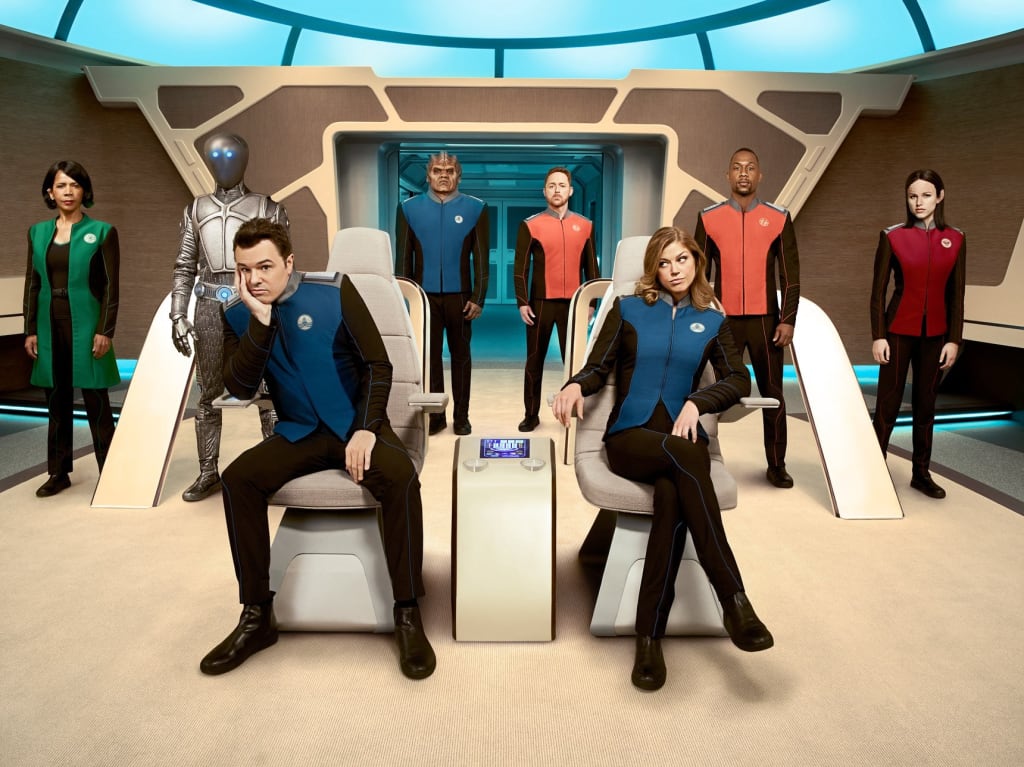Star Trek: The Orville
Why The Orville is an almost perfect spiritual successor to Star Trek

I love The Orville. It has a great dynamic between characters. There’s plenty of scifi. It’s a lot of fun. And overall, I’d say it’s scifi, and Trek, done right. I don’t think it was his intention, but MacFarlane, in trying to make a show that somewhat parodied Star Trek, while also being a homage to it, really did create a spiritual successor to Star Trek instead. This article is an updated version of my original review, written near the beginning of season one.
Overview
I originally started writing this review after the first couple of episodes of The Orville had aired. I loved the show. I was happy with it. And then the religion bashing started, and I had no idea how to write this review, on Geekers Keep. I had to mention the bigoted tone, but such commentary was too political for the site. Now that I have this website up and running, I think it is time to finally publish this review. Of course there are spoilers here, so maybe you should watch season one, available on Amazon, first. I will also briefly discuss the first two episodes of Star Trek Discovery.
Misleading Trailer
The trailers for the show were somewhat misleading, and I’m glad that I didn’t simply judge the show based on those trailers. Based on the trailers alone, it seemed as if MacFarlane’s character, Ed Mercer, was going to be a complete buffoon — someone who in reality would never be allowed near a ship. However, the initial scene establishes what really happened. His wife cheated on him, and he went from being a stellar candidate for a captain of a heavy cruiser to barely managing to keep his job.
Office Comedy in Space
The tension between Mercer and his ex wife add a layer to The Orville which is generally not found in other shows. While Star Trek certainly dealt with family issues, they were limited mostly to a single episode and the issues never really interfered with the performance of the crew. In this case, we see “real life” in a sci-fi show. And that’s part of why the humor works. Yes; much of it is stupid. For instance, when Dr. Aronov initially makes contact with the Orville, in the background his is dog, going on with his own business so to speak. Yes, it’s childish, but it’s also reality. Pets do embarrassing things in important situations. The main risk is that some of the more childish jokes could be repeated too often to the point that they become irritating. But unlike the jokes in other works by MacFarlane, The Orville seems to be hitting the right balance between seriousness and humor and manages to keep the jokes realistic enough and even important to the story.
Immaturity
A lot of people are annoyed with the immature scenes in The Orville. I love it. It’s not excessively immature and obnoxious, like Family Guy tends to be. It’s crude, but in a real way. It’s the kind of nonsense that does happen in real life, and that most scifi shows tend to ignore. Take the very first episode. Anyone have a dog? It’s probably a good thing we don’t use video conferencing too much, because dogs do what dogs do. It’s real.
Juxtaposition
Sitting right alongside extreme immaturity are serious and entertaining story-lines. This extreme and rapid shift between absurdly immature and incredibly poignant reminds me, in some ways, of Gintama. Sure, the genre is completely different, but it has the same kind of juxtaposition.
My favourite episode to date, “A Happy Refrain,” had plenty of both serious thought provoking scenes, and total absurdity.
Visual Aesthetics
The design of the ships in The Orville were beautiful. The Orville itself is sleek. The environment was bright and lively. It was obvious that the ships were meant to be lived in. This contrasts so heavily with the absolutely hideous design of the ship in Star Trek Discovery, which were dark and bleak and looked like they were submarines meant for battle rather than ships of exploration. In fact, the Discovery itself looked pretty damn ugly, as if some kid took Star Trek Lego sets for a Federation ship and a Klingon Bird of Prey and smashed them together. Even the NX-01 looked better.
Social Issues
The third episode of the series, “About a Girl,” really starts to delve into some complicated issues in much the same way that Star Trek TOS and TNG did. Unlikely many current shows, the “correct” answer is not as straightforward. The show leaves it to the viewers to think through what is the correct decision, and in fact the conflict resolution was likely not the one the viewers thought would occur. There were some who disagreed with the way the episode portrayed gender, and it is true that it was not perfect, but there was no clear indication of how the topic should be viewed.
Religiophobia
I’ve written about my discontent towards religiophobia already. I wish I didn’t have to include a discussion on it here, but I do. The first, “If the Stars Should Appear” immediately paints religion in a negative light. I could have tolerated one episode, but the episode “Krill,” not only made scientifically inaccurate statements, but did so in order to attack religion. The episode suggests that the more technologically “advanced” a society is, the less likely it is to be religious. However, that is not indicated by scientific theory or evidence. Indeed, while hunter and gatherer societies tend to have more loose animistic religions, it is agricultural societies which tend to see very organized religions, suggesting that the more complex society tends to have a more elaborate religious practice. Finally, “Mad Idolatry” finishes season one with a third and final attack on religion. Some have argued that Star Trek did the same thing, and Star Trek did, on occasion, criticize religion, or at least certain religious practices, but at the same time, there were numerous religious space faring races, including the Klingons, and those traditions were not attacked.
That one quarter of the first season was dedicated to attacking religion, and that many of the statements made against religion are simply contrary to scientific understanding of religion, and cultural evolution. For those reasons, I found season one to be very disappointing in many ways. I wanted to buy season one, as purchasing a copy of the episodes tends to help ensure future seasons, but I just could not bring myself to doing so. I was however looking forward to season two, and I had hoped that MacFarlane had worked out all his aggression towards religion in season one.
Digging a Hole
And so far I am mostly satisfied. But even still there are frustrations about the rhetoric. The writers, in their desire to paint the Krill as fanatical, dug themselves into a real hole. Yes, it’s scifi, but writings should still follow through with what they’ve started. In “Nothing Left on Earth Excepting Fishes,” if the Krill were really as fanatical as they were painted, they would have just blown up the ship from the inside, even if it meant suicide.
Moreover, the writers expressed this notion that technologically advanced societies would rid themselves of religion. As an anthropologist who studies religion, I don’t buy it. Religion has a lot of functions, and the propensity for religion is embedded deep within our psychology. Some technological advances wouldn’t change that, and in fact, organized theism largely emerged after the development of agriculture, and really in response to it.
But ignoring the pseudoscience used to bash religion, the assertion is also contradicted by Bortus’ comment that even in Moclan society, there are still many who practice astrology and believe in its value. In other words, there are still religious beliefs.
A Comparison to Discovery
I want to contrast this show to the actual Star Trek series that just started. Honestly, Discovery’s first episode was not as bad as I thought it was going to be, but that is not saying much. Discovery is a cookie cutter modern sci-fi show. As I mentioned earlier, the ship is dark and certainly not a place where you would want to work and live This aesthetic contrasts so clearly with the bright and clean atmosphere of the Orville, and in fact there is a whole video discussion on the designing of the Orville. There are also numerous plot holes and MacGuffins in the very first episode, and from what I have read, there is no change in the second episode. The first episode establishes that there had been no contact between the Klingons and the Federation in over 100 years prior to the start of the series. Yet Michael’s parents were supposedly killed by a Klingon raid. I would call a Klingon raid “contact between the Klingons and the federation.” Second, the first episode establishes that Michael and Georgiou’s relationship. They trusted one another, and had years of experience working together. Yet Michael ignores her commands and more or less single-handedly starts a war between the Federation and the Klingons, by tresspassing on their ship and then by killing someone who might as well be called “Klingon Jesus.”
I speak of MacGuffins, but I suppose there really is only one MacGuffin in the first two episodes: Michael herself. She is one giant MacGuffin which ignores any sense of realism in order to create a plot. It was poor writing that felt calculated and yet somehow lacking in thinking at the same time. Oddly, the show has received, for the most part, far better reviews than The Orville, at least when it comes to professional reviewers. The opposite seems to be true when it comes to the general audience.
Adapted from an article published at danielgoldman.us on march 29, 2018.
About the Creator
Daniel Goldman
Visit my homepage. I am a polymath and a rōnin scholar with interests in many areas, including political science, economics, history, and philosophy. I've been writing about all of these topics, and others, for the past two decades.







Comments
There are no comments for this story
Be the first to respond and start the conversation.